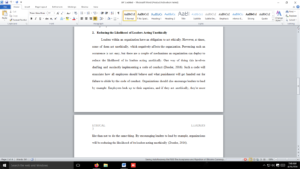Ethical Leaders
The seventh Debate Discussion assignment in this class relates to the HR Ethics box in Chapter 10 (p. 382):
HR Ethics: Building Ethics with Multisource Appraisals and Coaching
As business leaders get promoted, evidence suggests that there are more opportunities for ethical transgressions. Companies can do several things to help prevent ethical lapses. (1) Promote an ethical culture. (2) Use 360-degree evaluations. (3) Apply coaching. (4) Discuss the importance of ethical leadership.
- What kinds of approaches might you use to help leaders be more ethical? How could performance management processes be used to facilitate this aim?
- Besides some of the ideas already discussed, what do you think companies can do to reduce the likelihood of leaders acting unethically?
Your assignment is to 1) read the information in the box content, 2) answer these questions, 3) present/defend your ideas with thoughtful logic or relevant evidence, and 4) respond to at least two other students’ posts with other thoughtful analyses. Your posts should be comprehensive (multiple lengthy paragraphs), as well as concise and detailed.
Grades are assigned using a rubric with the following dimensions: 1) logic/support, 2) clarity/conciseness, 3) depth, 4) length, 5) contains multiple postings/responses.
Answer preview
Leaders within an organization have an obligation to act ethically. However, at times, some of them act unethically, which negatively affects the organization. Preventing such an occurrence is not easy, but there are a couple of mechanisms an organization can deploy to reduce the likelihood of its leaders acting unethically. One way of doing this involves drafting and succinctly implementing a code of conduct (Dessler, 2016). Such a code will enunciate how all employees should behave and what punishment will get handed out for failure to abide by the code of conduct. Organizations should also encourage leaders to lead by example.
[361 Words]

Ethical Leaders

